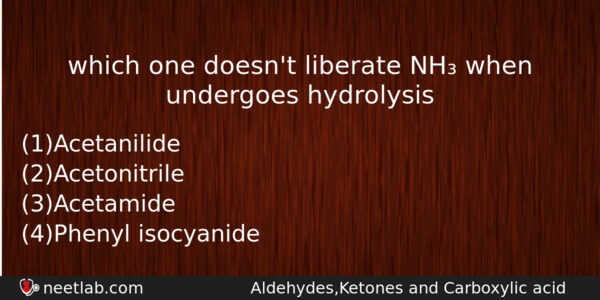| ⇦ | 
| ⇨ |
which one doesn’t liberate NH₃ when undergoes hydrolysis
Options
(a) Acetanilide
(b) Acetonitrile
(c) Acetamide
(d) Phenyl isocyanide
Correct Answer:
Phenyl isocyanide
Explanation:
No explanation available. Be the first to write the explanation for this question by commenting below.
Related Questions: - Amines behave as
- Which of the following is not true
- At 25⁰C, the dissociation constant of a base, BOH, is 1.0 ˣ 10⁻¹².
- NaOCl is used as a bleaching agent and sterilising agent. It can be synthesized
- Peroxide effect can be checked by the addition of sufficient amount of
Topics: Aldehydes Ketones and Carboxylic Acid
(89)
Subject: Chemistry
(2512)
Important MCQs Based on Medical Entrance Examinations To Improve Your NEET Score
- Amines behave as
- Which of the following is not true
- At 25⁰C, the dissociation constant of a base, BOH, is 1.0 ˣ 10⁻¹².
- NaOCl is used as a bleaching agent and sterilising agent. It can be synthesized
- Peroxide effect can be checked by the addition of sufficient amount of
Topics: Aldehydes Ketones and Carboxylic Acid (89)
Subject: Chemistry (2512)
Important MCQs Based on Medical Entrance Examinations To Improve Your NEET Score
18000+ students are using NEETLab to improve their score. What about you?
Solve Previous Year MCQs, Mock Tests, Topicwise Practice Tests, Identify Weak Topics, Formula Flash cards and much more is available in NEETLab Android App to improve your NEET score.
Share this page with your friends

Leave a Reply